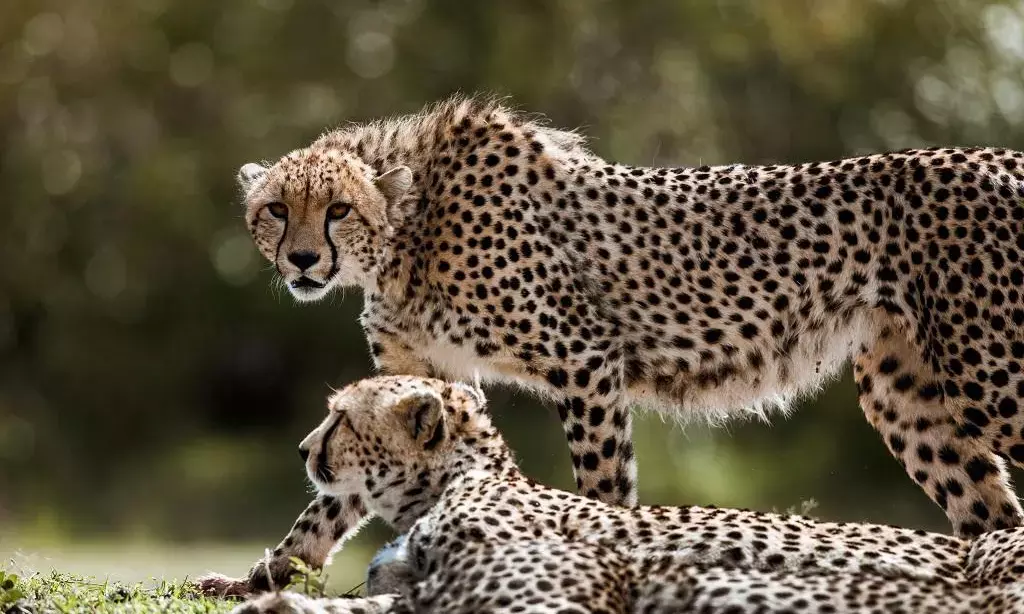Requiem For Kuno’s Cheetahs
So far, 10 imported Cheetahs have died in India after relocation from Namibia

This is CowSpeak. Actually I don’t say much except ‘Moo’ and since I am an Odiya ‘gaai’, whenever I say ‘Moo’ it means I am talking of ‘Me’; because in this beautiful language of the East, ‘Moo’ translates to ‘I’. So when I am mooing on the streets, it’s my way of attracting attention so my side of the story can be heard.
But even though ‘I’ and ‘Me’ are very empowering words, today I’m not here to talk of ‘Myself’ but my friends, the Cheetahs. In 2009, when the Indian government officially proposed the introduction of African cheetahs, the wildlife experts said that importing African animals violated international conservation standards and the proposal was halted by the Supreme Court. I was glad because I know highly stressful relocation is.
But two years back, on a mission to re-establish the ecological function of Indian grasslands, a few of these cats were brought all the way from South Africa in a special plane. This act was projected as the most ambitious wildlife reintroduction programme India has seen. They were then flown to the Kuno National Park in two Indian Air Force helicopters. Twelve more Cheetahs soon followed suit.
With the Cheetahs, also came a multiple of queries, including the chances of their survival in India’s wild. Many wildlife experts and conservationists raised questions about the viability of the entire exercise. The animals that were brought from Namibia, were not genetically the same species.
And even if the Project was titled ‘Re-introduction’, implying that the cats were merely being brought back, in reality it was an introduction of an exotic species into the wild. According to my bovine knowledge it sure sounds like a violation of the Wildlife Protection Act of 1972.
Anyway, ever since her arrival, a female cat called Sasha started to have kidney problems. And in March last year, she was taken ill and died. Everyone in our community kept yelling ‘Moo Moo Moo’. And this time it wasn’t because we wanted to be heard but because it was our only way of expressing our sorrow. It was also because we wanted the world to hear the story of our comrades.
But that’s not all. We had a lot of mooing to do in the following months too, because in April, a second Cheetah called Uday fell sick and died. In May Daksha, a third female cat got fatally injured in a confrontation with two male cats, and because of this violent mating encounter, she also lost her life.
The death of three unnamed cubs soon followed and apart from mooing, we also shed tears because only a cow knows what it is to be separated from her calves. Then I lost touch of the names as two more Cheetahs died due to infections caused by the collars fitted around their necks.
The most recent death was attributed to a maggot infection. So until now 10 exotic cats have crossed the Rainbow Bridge, or whatever bridge the cheetahs are supposed to cross after they die.
So why did they die? Some officials said that not enough space was reserved for the animals, while others complained the project was unduly rushed. Some said that fatalities were expected but with time things would soon stabilise.
But with so many precious lives lost and so much of mooing, according to my bovine knowledge, there should be some serious rethinking of the entire project. But guess what? Instead of halting further re-introductions, the humans in the forest department thought it was a better idea to relocate a few senior wildlife officials instead.
Even if I am not a wild and exotic animal like the Cheetah to be flaunted as a project, or hunted as a trophy, my gentle demeanour and my response to kindness, makes me a sacrosanct animal in my country. I symbolise wealth, strength and motherly love. I represent fertility and bounty.
I am believed to be the earthly representative of the divine and nourishing Mother Goddess. No one can beat the level of attitude I give out by just standing tall and still in the middle of a busy road.
And yet. Even if humans think change is good, sometimes they can be disastrous, because adaptation to any new habitat is always a risky process. As a cow who has seen green pastures, I also know how difficult it is to survive in the wilderness. As someone who is loved and revered, I also know how it feels to be discarded when I am no longer productive.
With my constant forage for food and shelter when dislodged from familiar surroundings, I know how the streets are fraught with dangers. In the long and arduous process of acclimatisation, even if I am just a domesticated ‘Allah Miyan ki Gaai’, I know the dreadful feeling of being petted and then forgotten.
I know exactly how it feels to be uprooted from the Goshalas and taken to the abattoirs to be turned into meat. And although people feel we animals have no soul, the truth is we are far from being soulless. Perhaps that is why unlike the humans, I can feel the pain of all my relocated friends who were left to Mother Nature to deal with their funeral rites.
Rest in peace dear Cheetahs!


